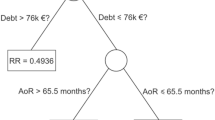Abstract
Recent stories of corporate insiders avoiding losses and, in some cases, generating enormous personal profits as their companies crumbled have led investors to question the integrity of American business and the fairness of the United States stock markets. The SEC tries to ensure the fairness of the stock markets by making and enforcing laws against unfair practices such as insider trading. In the United States, when insiders trade stock based on non-public information, they have broken the law and betrayed the trust that has been placed in them.
This study used student subjects to test the relationship between the likelihood of trading based on insider information and subjective probabilities of deterrents and motivations for insider trading. Expected gain, guilt, cynicism, and fairness of laws were the determinants that had a significant relationship with the intent to trade based on insider information. This study also found support for prospect theory with regard to insider trading. The results indicate that subjects are more likely to trade based on insider information to avoid a loss than to achieve an abnormal gain. The study also finds evidence of social desirability response bias.
Additional findings of the study were that subjects did not view the determinants for themselves in a manner consistent with how they viewed those same deterrents and motivations for other people. Also, a test of the effects of gender found that certainty and social stigma were significantly higher for female respondents than for male respondents.
Similar content being viewed by others
References
Abdolmohammadi, M. and J. Sultan: 2002, 'Ethical Reasoning and the Use of Insider Information in Stock Trading', Journal of Business Ethics 37, 165-173.
Ali, M. M., H. W. Cecil and J. A. Knoblett: 2001, 'The Effects of Tax Rates and Enforcement Policies on Taxpayer Compliance: A Study of Self-Employed Taxpayers', Atlantic Economic Journal 29, 186-202.
Alm, J., B. R. Jackson and M. Mckee: 1992, 'Estimating the Determinates of Taxpayer Compliance with Experimental Data', National Tax Journal 45, 107-114.
Beck P. J., J. S. Davis and W. Jung: 1991, 'Experimental Evidence on Taxpayer Reporting Under Uncertainty', The Accounting Review 66(3), 535-558.
Becker, G. S.: 1968, 'Crime and Punishment: An Economic Approach', The Journal of Political Economy 76(2), 169-217.
Burns, J.: 1999, 'SEC Seeks Comments on Changes to Insider Trading Rule', Dow Jones News Service (December 15).
Dunkelberg, J. and D. R. Jessup: 2001, 'So Then Why Did You Do It', Journal of Business Ethics 29, 51-63.
Fischer, C. M., M. Wartick and M. M. Mark: 1992, 'Detection Probability and Taxpayer Compliance: A Review of the Literature', Journal of Accounting Literature 11, 1-46.
Grasmick, H. G. and D. E. Green: 1980, 'Legal Punishment, Social Disapproval and Internalization as Inhibitors of Illegal Behavior', Journal of Criminal Law and Criminology 71, 325-335.
Grasmick, H. G. and W. J. Scott: 1982, 'Tax Evasion and Mechanisms of Social Control: A Comparison with Grand and Petty Theft', Journal of Economic Psychology 2, 213-230.
Jensen, G. F., M. L. Erickson and J. P. Gibbs: 1978, 'Perceived Risk of Punishment and Self-Reported Delinquency', Social Forces 57, 57-78.
Kahneman, D. and A. Tversky: 1979, 'Prospect Theory: An Analysis of Decision under Risk', Econometrica 47(2), 263-292.
McCarthy, F. T.: 2000, 'The Cost of Inequity: The Cost of Insider Trading', The Economist (January 22).
Ma, Y. and H. Sun: 1998, 'Where Should the Line be Drawn on Insider Trading Ethics?', Journal of Business Ethics 17, 67-75.
Marsden, J. R. and Y. A. Tung: 1999, 'The Use of Information Technology to Develop Tests on Insider Trading and Asymmetric Information', Management Science 45, 1025-1040.
Mason, R., and L. D. Calvin: 1984, 'Public Confidence and Admitted Tax Evasion', National Tax Journal 37, 489-496.
Newkirk, T. C. and M. A. Robertson: 1998, 'Insider Trading-A U.S. Perspective', Speech by SEC Staff at the 16th International Symposium on Economic Crime (Jesus College, Cambridge, England).
Randall, D. M. and M. F. Fernandes: 1991, 'The Social Desirability Response Bias in Ethics Research', Journal of Business Ethics 10, 805-817.
Reall, M. J., J. J. Bailey and S. K. Stoll: 1998, 'Moral Reasoning “On Hold” During a Competitive Game', Journal of Business Ethics 17, 1205-1210.
Salter, S. B., D. M. Guffey and J. J. McMillan: 2001, 'Truth, Consequences and Culture: A Comparative Examination of Cheating and Attitudes about Cheating among U.S. and U.K. Students', Journal of Business Ethics 31, 37-50.
Scott, W. J. and H. G. Grasmick: 1981, 'Deterrence and Income Tax Cheating: Testing Interaction Hypothesis in Utilitarian Theories', The Journal of Applied Behavioral Science 17(3), 395-408.
SEC Written Statement Concerning Regulation Fair 322 Joseph D. Beams et al. Disclosure, May 17, 2001, Given to Subcommittee on Capital Markets, Insurance and Government Sponsored Enterprises Committee on Financial Services United States House of Representatives.
Seyhun, H. N.: 1992, 'The Effectiveness of the Insider Trading Sanctions', Journal of Law and Economics 35, 149-182.
Snoeyenbos, M. and K. Smith: 2000, 'Ma and Sun on Insider Trading Ethics', Journal of Business Ethics 28, 361-363.
Tittle, C. R.: 1980, Sanctions and Social Deviance, The Question of Deterrence (Praeger Publishers, New York, NY).
U.S. Securities and Exchange Commission (SEC): 2001, 'Insider Trading', Available at: http://www.sec.gov/answers/insider.htm.
Author information
Authors and Affiliations
Rights and permissions
About this article
Cite this article
Beams, J.D., Brown, R.M. & Killough, L.N. An Experiment Testing the Determinants of Non-Compliance with Insider Trading Laws. Journal of Business Ethics 45, 309–323 (2003). https://doi.org/10.1023/A:1024159730463
Issue Date:
DOI: https://doi.org/10.1023/A:1024159730463




